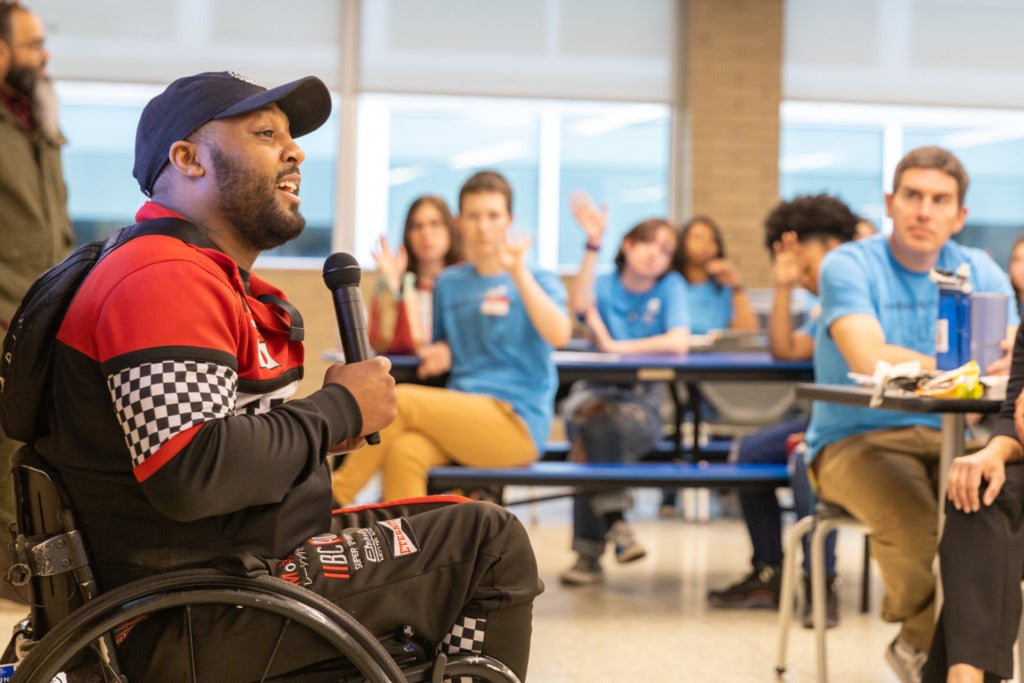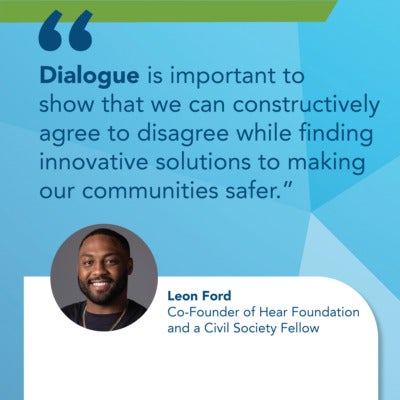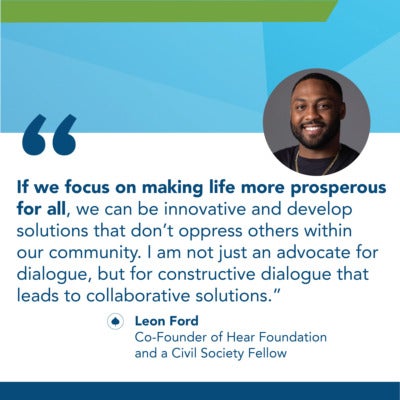The McNulty Prize Catalyst Fund recognizes social impact ventures at critical junctures on their path to creating meaningful impact. Catalyst Fund winners exhibit high potential to deepen or widen their impact, demonstrate significant early momentum, and have critical need. The McNulty Foundation established the Catalyst Fund at the Aspen Institute in 2017 to provide unrestricted support to promising ventures led by Fellows of the Aspen Global Leadership Network. Having supported over 20 recipients from around the world, the Catalyst Fund boosts leaders and their organizations with funding as well as non-monetary support. The Fund has received more than $1.3 million in contributions, including a matching grant from the McNulty Foundation.This year, five exceptional organizations have won support from the McNulty Prize Catalyst Fund. In this Q&A, learn more about one of those organizations: The Hear Foundation. 
Leadership is instrumental in every aspect of society. We need people who are curious and courageous. Curiosity inspires us to ask questions, and courage helps us to challenge the status quo.
Leon Ford, Co-founder, Hear Foundation and Civil Society Fellow
When Leon Ford was shot and paralyzed by police, he spent eight years not just processing his own experience, but engaging in activism to create a safe Pittsburg through genuine relationships between police and community. Ford and Pittsburgh’s Chief of Police co-founded the Hear Foundation, which makes community microgrants and delivers programs on reducing gun violence, addressing trauma, and workforce development.
What does leadership mean to you?
Leadership is the ability to consider what has been done effectively and ineffectively as you forge a path forward. Guidance sometimes comes instinctively, while other times it may come from a form of instruction. Whatever the case may be, the leader must be willing to think for themselves in the direction of a solution that doesn’t solely benefit themselves but significantly impacts a larger group. My mentor Malcolm Thomas always says that a leader cannot teach what they do not know, or lead where they will not go.
Personal transformation can be a powerful catalyst for leaders as they grow. What’s an example of transformation you’ve experienced, and how has it impacted how you lead?
My personal transformation can be likened to that of “The Hero’s Journey.” As a child, I always felt called to lead. However, I did not know what my journey would entail. After being shot, my heart filled with anger, frustration, confusion, and resentment. Getting to a place of love, understanding, and healing took years of therapy and self-reflection. My mindset shifted from being vengeful to hopeful. Being hopeful facilitated a paradigm shift and gave me the inspiration not only to heal myself but to heal my community. For many, my aspiration to heal my community was unrealistic. It was up to me to lean on my instinctive voice and forge a new path of reconciliation. My personal transformation took me from being justifiably homicidal to being a convener of love.
Can you share the pivotal moment that catalyzed you to start this work?
At the age of nineteen, I was shot five times by a Pittsburgh police officer. As a result, I was paralyzed and charged with several felony offenses that could’ve landed me in prison for up to twenty years. Fortunately, I was acquitted of all charges. The shooting and trial that followed prompted my call to activism. I never woke up with the inspiration to become an activist. I was fighting for my life and freedom. As time went on, I learned more about people and institutions. This new awareness helped with my transformation from being a victim to victorious.

What role do you feel leadership plays in advancing social change and/or fixing unjust systems?
Leadership is instrumental in every aspect of society. We need people who are curious and courageous. Curiosity inspires us to ask questions, and courage helps us to challenge the status quo. What is just today may be unjust tomorrow. Therefore, change requires leaders to continue educating themselves, following their moral compass, seeking wise counsel, and making the best decisions based on acquired information. You won’t always get it right, but that’s okay; getting it wrong is also a part of being a leader.
How does your personal or professional network impact how you lead?
My professional network plays a significant role in my decision-making process. I am a huge advocate for leaders having wise counsel. Most leaders fail when their ego becomes larger than their counsel or if they never had good counsel to begin with.
The Hear Foundation brings together residents, police, community groups, and experts to actively listen and learn from one another. Why is dialogue important to the work that the foundation does in the world? Why is it important for leaders to model the practice of dialogue?
In the age of social media and non-reputable news sources, we’ve seen an increase in rhetoric without a desire to resolve conflict. This “if it bleeds, it leads” mentality has created this “us versus them” perspective. Dialogue is important to show that we can constructively agree to disagree while finding innovative solutions to making our communities safer. It is interesting that most people want the same things regarding safety and good health for their loved ones, good education, a nice home, and being economically sound. If we focus on making life more prosperous for all, we can be innovative and develop solutions that don’t oppress others within our community. I am not just an advocate for dialogue, but for constructive dialogue that leads to collaborative solutions.

The Aspen Institute understands that powerful transformative experiences can shift our worldviews and leadership styles. How does the Hear Foundation incorporate transformative experience in its work to address gun violence, trauma, and community well-being?
At the Hear Foundation, we don’t believe that we have one-off solutions to gun violence, trauma, and community well-being. However, we’ve created a platform like a roundtable where we view community leaders as experts, listen to their diverse voices, and empower them to do the work at a micro and macro level while simultaneously promoting collaboration. This is done through building meaningful relationships based on trust, respect, and accountability. The process of facilitating relationship building and collaboration started with our very diverse board. Building our board of many different backgrounds and perspectives took over a year of meeting of the minds. Now we’ve taken this approach by meeting community leaders, organizations, and institutions weekly in an ecosystem mapping way to gauge how we can fill gaps, maximize resources, and help to facilitate collaboration. It’s worth noting that we are a new organization, so understanding the landscape and building trust within the community and among law enforcement is critical.
Learn more about the 2023 McNulty Prize Catalyst Fund winners and the Aspen Global Leadership Network.
